Have you noticed the reviews on the cover of your favorite book? Appraising reviews enhance the value of the author. While at a bookstore surfing through random books, the reviews decide for you to buy them. The same applies to hiring managers browsing through resumes containing professional references.
However, there are several questions to this, like, is more the merrier? How do you advertise yourself without coming out too strong? Who are the appropriate references? How do you list them on your resume?
We have done the job of curating all your answers in this guide. The only thing you have to do is read on.
Let us take a glance at the content of this guide.
- What are professional references?
- How to choose professionals as references?
- How to list professional references on your resume?
- 4 reasons why references matter
- Difference between professional and personal references
- What does your potential employer ask your previous employer?
- Frequently asked questions
So, delve in!
What are professional references?
Professional references can be considered your personal cheerleaders in the job market. They are the people who can vouch for your skills, work ethic, and character to potential employers.
Hiring managers often request these references to determine whether you're a good fit for a specific position. So, choose your references wisely and make sure they're people who can help you stand out from the competition!
How to choose professionals as references?
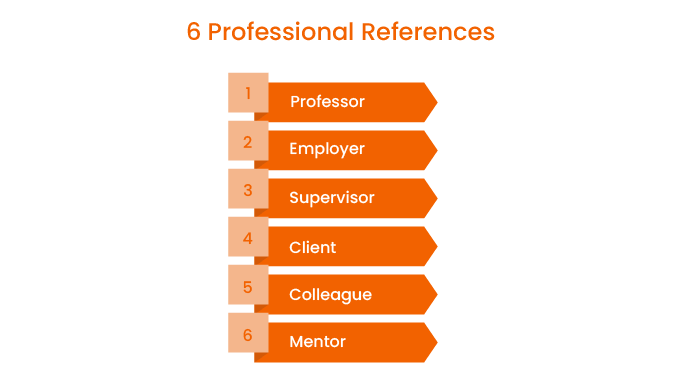
Professional references are typically individuals with whom you have worked in a professional capacity. They should be able to speak about your qualifications, work ethic, and character and provide an adequate understanding of your performance.
Here are 6 individuals that can be chosen as your professional reference:
1. Professor
A professor qualifies as a reference if you've worked with them closely in an academic setting. An example can be if you’ve done a research project or an internship with him. This enables him to gain insight into your work ethic, communication skills, and ability to work in a team.
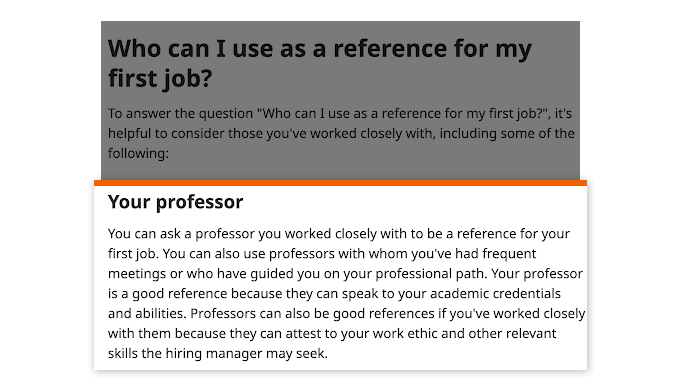
Source: Indeed.
2. Employer
A past employer can qualify as a reference in any case. They’re termed valuable references since they have a detailed understanding of your strengths and weaknesses. As references, they are the most trusted ones. They can speak to your performance, work style, and overall suitability for the position you're applying for.
3. Supervisor
If you have a supervisor who has managed you directly in the past, then she/he can act as an excellent reference. Your manager or supervisor can provide feedback about your skills in managing a team, collaborating with your team, or working independently.
4. Client
Do you have clients that you’ve worked with in the past and built strong relations with them? If yes, they can be valuable references who can speak of your communication skills, ability to manage relationships, and overall professionalism.
5. Colleague
Nobody has worked as personally with you as much as your colleagues. Your colleagues can provide a unique perspective on your work, collaboration skills, and ability to work well with others. While mentioning them as references, ensure to mention the ones who you’ve actually worked with efficiently.
6. Mentor
Think of a mentor as a wise, experienced guide who has watched you grow and develop your skills over time. So, if you have a mentor you think would make a great reference, don't hesitate to ask for their support. In fact, having a mentor vouch for your skills and character can carry a lot of weight in the eyes of potential employers.
When selecting your references, be sure to ask for their permission and provide them with enough context about the position you’ve applied for. You could also give them a copy of your resume or CV. This is so they can speak specifically about the skills and qualifications needed for the position.
Overall, choosing the right professional references can be a crucial component of the job search process, as they can help to provide validation, differentiation, insight, and opportunities.
How to list professional references on your resume?

Ensure to provide enough information while listing your professional references in your resume/CV. If it’s too much to fill in, you can include the list in your cover letter submitted during the job application.
Your potential employer should have a rough idea of what they do and how they are related to you. In addition, make sure that they should be easy to contact. Here are some important details a list of work references includes:
1. Full name: Ensure to write the right name with correct spelling
2. Job title: Their position can give credibility to their testimony of your work experience and skills.
3. Company name: The company demonstrates the caliber of the organization you have worked with.
4. Contact information: Easy reach-out option for employers for any additional information.
5. Relationship with you: Provides valuable information on your work principles, personality, and how you work with others.
6. Work duration: Indicates the length of time they have observed and worked with you, which can provide a more comprehensive assessment of your abilities.
7. Projects worked together: Showcase specific examples of your skills and how you have contributed to achieving organizational goals.
Here’s a template to make things easier for you:
Name: [Full Name of Reference]
Job Title: [Job Title of Reference]
Company Name: [Company Name of Reference]
Contact Information: [Email Address and/or Phone Number of Reference]
Relationship with You: [How the Reference Knows You (e.g., former supervisor, colleague, mentor)]
Work Duration: [Duration of Time Worked Together (e.g., 3 years)]
Projects Worked Together: [Specific Projects Worked Together (e.g., led a successful product launch)]
3 Examples of how you should write your references list
Example 1
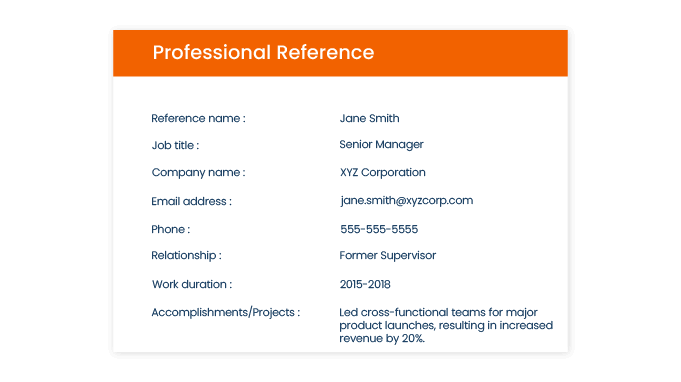
Jane Smith, Senior Manager at XYZ Corporation
Email: jane.smith@xyzcorp.com, Phone: 555-555-5555
Relationship: Former Supervisor
Worked together from 2015 to 2018
Accomplishments/Projects: Led cross-functional teams for major product launches, resulting in increased revenue by 20%.
Examples 2
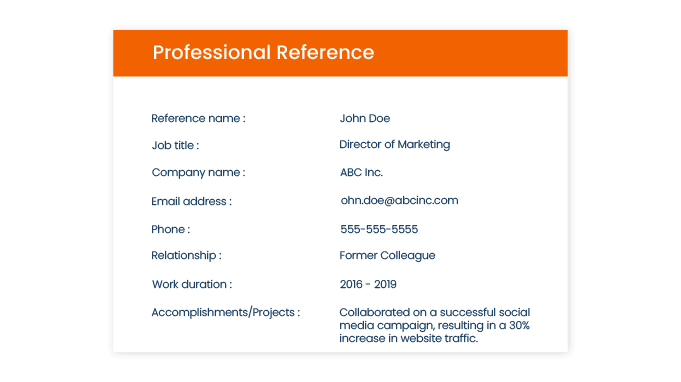
John Doe, Director of Marketing at ABC Inc.
Email: john.doe@abcinc.com, Phone: 555-555-5555
Relationship: Former Colleague
Worked together from 2016 to 2019
Accomplishments/Projects: Collaborated on a successful social media campaign, resulting in a 30% increase in website traffic.
Examples 3
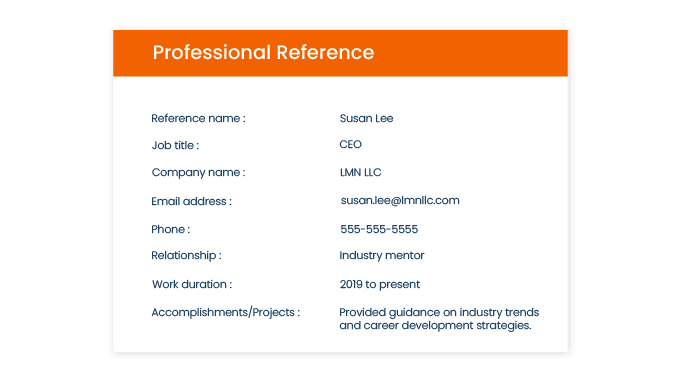
Susan Lee, CEO of LMN LLC
Email: susan.lee@lmnllc.com, Phone: 555-555-5555
Relationship: Industry mentor
Worked together from 2019 to present
Accomplishments/Projects: Provided guidance on industry trends and career development strategies.
4 reasons why references matter
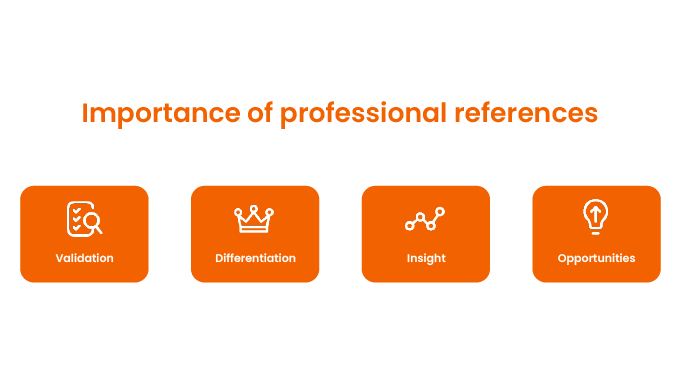
Choosing strong professional references increases your chances of landing your dream job and advancing your career. Your references are assumed to discuss your strengths and accomplishments, encouraging your hiring managers to invest in you.
Infact, 70% of employers conduct a reference check for every candidate they interview. Candidates with no references or negative responses are ruled out 20% of the time. This should make you realize the importance of references during your job search. If not, here are 4 more reasons why you should consider including your references in your resume.
1. Validation
Professional references act as a validation for your competencies, achievements, and work ethic. Having someone vouch for your skills and abilities validates you as a candidate in front of your prospective employers. This makes you more likely to be seen as a credible and trustworthy candidate.
There’s another way of providing validation to your employer: Portfolios! You can develop portfolios regardless of your field.
2. Differentiation
Strong references can differentiate you from candidates with similar qualifications and experience. If your references are well-respected in your field, they can help set you apart and make you a more attractive candidate.
3. Insight
References are people who have worked with you in the past. Hence, they can provide valuable insight into your personality, work style, and ability to work well with others. This information benefits your hiring manager and will be a deciding factor for them while making a job offer.
4. Opportunities:
Positive references can open doors to new opportunities, whether a new job, a promotion, or a referral to another company or client. Building strong relationships with your references creates a network of people who can help advance your career.
Difference between professional and personal references:
Personal references are usually people to whom you are related personally. They do not have any professional experience with you. However, more than professional peers, they can speak about your character and personal qualities better.
In contrast, a professional reference is someone you have worked with in the past. They do not necessarily know you personally and can only assess you as a professional. Here is a table highlighting the main differences between professional and personal references:
| Criteria | Professional Reference | Personal Reference |
|---|---|---|
| Relationship | Work-related | Personal/Friendship |
| Contact Information | Professional Contact Information | Personal Contact Information |
| Work Experience | Focus on Work Experience and Skills | May Include Non-Work Experience |
| Character Assessment | Professional Qualities, and Work Ethic | Personal Qualities and Character |
| Industry Reputation | Can Boost Credibility | May Not Be Related to Industry |
| Scope of Reference Check | Narrow Focus on Work-Related Information | Broader Scope of Information |
| Legal Liability | Potential Legal Liability for Inaccurate Information | Minimal Legal Liability |
| Purpose of Reference Check | Screening for Employment | Personal, Character or Tenant Screening |
Employers do not usually involve personal references during hiring. Personal references are more relevant in tenant reviews and character screening. Gaining an insight into one’s personal behavior is not relevant to employers.
What does your potential employer ask your previous employer?
When a potential employer contacts your previous employer for a reference check, they may ask about various aspects of your job performance. Some of those include
1. Employment dates and job title: To confirm your work history and position.
2. Job duties and responsibilities: To understand your job duties and responsibilities and verify if you have relevant experience for the job you're applying for.
3. Performance at work: To get a sense of how well you performed in your previous role, including your strengths and areas for improvement.
4. Common work habits: To understand your work habits, such as punctuality, attendance, and attitude.
5. Interpersonal skills: To learn how you interacted with colleagues, clients, and customers and gauge your communication and teamwork skills.
6. Reasons for leaving the job: To understand why you left the company and if there were any performance issues or concerns.
Being truthful and professional in your job performance and conduct is important, as this information may be verified during a reference check.
Using LinkedIn for professional networking

LinkedIn stands as one of the most powerful tools for creating professional networks and relationships. But how can LinkedIn be used to build your references?
You might have noticed or come across the LinkedIn recommendation and endorsement section. The recommendation section basically highlights recommendations and references written by people you’ve worked with in the past.
The skills and endorsement section is similar too. You can add upto 50 skills to your profile, and your connections get to endorse them! What does endorsement mean?
Endorsement is simply a validation from your friends, peers, or colleagues that you’re experienced and proficient in the skills you’ve mentioned. The more endorsements you have, the better.
Learn more tips on how to optimize your LinkedIn profile: Guide: How to find a job on LinkedIn?
Frequently Asked Questions (FAQs)
1. Can a friend act as a professional reference?
Yes, having a friend as a professional reference is possible. However, don’t get a very close friend involved since your employer will most likely not trust them entirely. Ensuring they can speak about your work experience and skills is important. They should be able to provide credible information that attests to your professional abilities rather than just speaking to your character or qualities.
2. Can you use a family member as a reference?
Using a family member as a reference is generally not recommended, as they may be perceived as biased in their assessment. Ideally, you want someone who can provide a professional perspective on your skills and work experience. A family member may not be the best choice. However, if you’ve actively worked with a family member in the past, they can be considered a reference but, again, not a very viable one.
3. Can you get a job without any references?
Yes, getting a job without any references is possible, especially if you're just starting out in your career. However, having references can help demonstrate your qualifications and give employers a better sense of your skills. If you don't have any work references, you can consider using academic references (like mentors and professors) or personal references as an alternative.
4. How many references should you have?
It's generally recommended to have three or four professional references. However, this can vary depending on the job and the employer's requirements. Some job postings may specify the number of references they need or prefer. Expert-level job positions require more references, like seven or eight, as their years of experience increase.
5. Do employers actually check your references?
Yes, employers commonly check references as part of their hiring process. References may be contacted by phone, email, or online survey to ask about your job performance and work habits. Ensure you provide accurate and up-to-date information and choose references who can speak positively and knowledgeably about your work.



